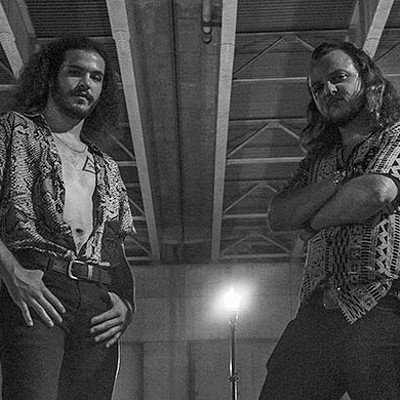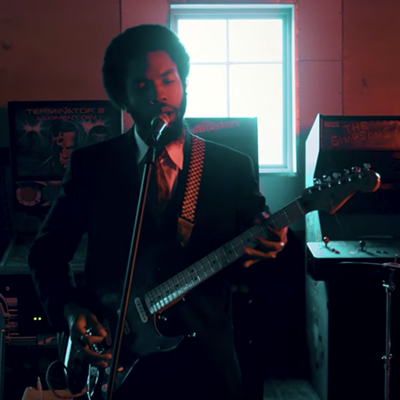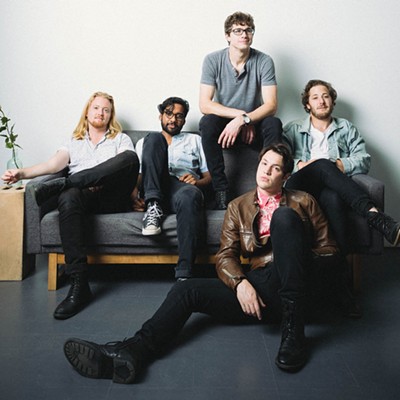Bob Marley lying on an unlikely (and premature) deathbed, an assassin's bullet having pierced his flesh. Fela Kuti, the Black President: Nigeria's neo-fascist government's most wanted. Crass, The Clash, Angelic Upstarts, the Redskins: punk gigs punctuated regularly by the exclamation point of radical-right hooks and police batons. Chuck D, Dr. Dre and Tupac Shakur's FBI files: the modern-day COINTELPRO of a system terrified of the possibility of a black youth, let alone A Black Planet.
Pop's changes -- not changes merely in pop music, but in culture -- have always come as hotly contested as any political or social upheaval. And more often than not from violence, pain and suffering. So perhaps it is time to add to the list Keddou ag Ossad storming into Malian police stations with Kalishnikov in hand and guitar strapped to his back, with his band Taghreft Tinariwen producing the soundtrack to a generation of wars between their nomadic culture and an imposed, oppressive government.
Perhaps victory is at hand, because there's something downright liberating within Amassakoul, the sophomore worldwide release from Saharan griot-guitarists Tinariwen, rebel hypnotists of the Tuareg nomads. Born of the Mauritanian refugee camps and Libyan cab stands to which the Tuareg fled when the Malian government declared war on the nomads, Tinariwen soaked in the tainted Western electric guitar sounds ubiquitous in Earth's cities, and added the deep bluesy funk of camel breath and desert dub. But rather than the aggressive, angry funk of sub-Saharan neighbors such as Fela, or the clenched sounds of punk, Tinariwen's Amassakoul comes across as a desert Junior Kimbrough, weaving dense clouds of droning guitars and ticking-watch rhythms, all supporting the call-and-response sing-chants of the group's number. (At least eight or nine performers grace most tracks.)
Thirst is the common theme of Amassakoul. The Tuareg thirst for their past freedoms, past glories, past commonalities. Tinariwen has gone a long way toward reclaiming that for its people: With the annual Festival in the Desert, the group helped recreate the gatherings of the Tuareg decimated by civil wars. And by providing an internationally recognized cultural focal point, perhaps this band of men and women, garbed in traditional dress and hefting non-traditional instrumentation, will have done more musically than a thousand Kalishnikovs and a thousand lives lost. With more records like Amassakoul, revolution must be at hand.
Various Artists
Festival in the Desert (DVD)
World Village
The stark beauty of the Sahara, 40 miles from Timbuktu, is somehow only enhanced when trampled by score after score of camel, mounted by men in indigo veils and blue jeans, their backs weighted by Fender and Gibson. To the nomadic Tuareg people of Mali, the traditional festival times are occasions of great importance for settling disputes, trading news and sharing culture. Brutal oppression of Tuareg rebels in the 1980s and '90s by the Malian government, and the droughts of the past decade, put an end to many of these gatherings. But the surging interest in Mali's music -- centered on the likes of Ali Farka Touré and Tinariwen -- has created a new opportunity to revamp the old traditions. Thus, Festival in the Desert: a cultural meet-up disguised as a music festival, already an integral part of the Tuareg balance between maintaining the old ways and winning the mad dash to modernization.
This new DVD documentary of 2003's Festival features performances by the main players in the Malian cultural revolution (Tinariwen, Touré, Django, Tartit) as well as European and American well-wishers (Robert Plant, Blackfire and Festival co-organizers Lo'Jo.) The performances are all interesting and -- in cases such as Tinariwen's dazzling stage-full of musicians performing "Amassakoul 'n' Tenere" -- sometimes brilliant. But more important, perhaps, are filmmaker Lionel Brouet's attention to his interview subjects, such as the insightful Tartit vocalist Disco and festival producer Issa Dicko, as well as to the landscape of the festival site and its population.
Unfortunately, the performance that gets the most screen-time is Robert Plant's Tinariwen-inspired desert-blues snake-take on "If I Ever Get Lucky." And while augmented by Lo'Jo drummers, and fascinating in context (the Robert Johnson and John Lee Hooker licks really do seem more African than American), it's still ever-familiar stuff to anyone ever before within earshot of classic-rock radio. Plant completists (good god, are there such creatures?) will love it. The rest of us will tire after a few of his seven minutes.
More interesting by far is the immediate and vehement audience response to Blackfire, an Arizona-based Navajo punk band. Even in English, Blackfire's "Common Enemy," with stock chugging guitars and shouted vocals, strikes some kind of chord with the audience. Plant's blues-laced Africanisms may be ethnomusicologically closer to the Tuareg sound, but obviously the physical catharsis and raised fist of a similarly oppressed people is more immediately recognizable.
Lo'Jo
ce soir lí ...
World Village
In the Loire Valley region of central France that gave birth to their eccentric troupe, the members of Lo'Jo rubbed shoulders with their neighbors' ghosts: da Vinci, Rabelais, Gainsbourg. The pedigree of that soil wore off -- da Vinci's definition of Renaissance Man diversity; Rabelais' love of the revolutionary power of carnival and laughter, of the grandness of hyperbole; Gainsbourg's smoky appreciation of a world of sexuality, tempered by the Gallic confidence in his own Parisian café charms.
In 20 years as Lo'Jo, front man and singer Denis Péan and instrumentalist Richard Bourrean have taken these traits and loves and borne them through the ruinous geography of the pan-Francophonic world. At times, Lo'Jo can be something of a world-music-a-thon, cramming as many regions into a song as possible, though unlike some world-blitzers, there are also moments of relative calm. "Mon Amour" and "Chaque Humain" act mostly as interstitial pieces, with Péan alone on the piano, and the solidly grounded "Tiene la Bandera" (located, in this case, in a theatrical tango soundtrack) rests on European laurels without sub-Saharan drums or Turkish flutes.
In a world where everyone with ProTools thinks they're globalized, it's refreshing to hear a world-fusion ensemble capable of playing so many hands thanks to travel and on-the-spot absorption, rather than being a world (-wide Web) music group. Lo'Jo has brought groups such as Gangbé Brass Band and Tinariwen (with whom Lo'Jo helped organize 2003's installment of the Festival in the Desert event) to the attention of Europe and now the U.S. Along with newer fellow travelers, such as the more avant-garde sound seeker DJ/Rupture (whose Special Gunpowder album is the 21st-century version of Lo'Jo's seek-and-disseminate musical hostelling), Lo'Jo is a great example of a group able to combine global geography and technical virtuosity into a curious yet well-defined sense of musical self.

















